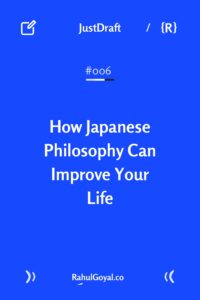7 Japanese Concepts Like Ikigai and Kaizen for a Better, Balanced Life
Let’s talk about some powerful life principles or Japanese Concepts from Japanese culture that can help you lead a more fulfilling, balanced, and mindful life. These aren’t just buzzwords; they’re age-old concepts that have stood the test of time, offering wisdom on how to navigate life’s ups and downs.
One Topic
Let’s me share 7 Japanese concepts and see how they can make a real difference in your daily routine.
Ikigai (生きがい) – Find Your Purpose
Ikigai (one of the most famous Japanese concepts) is about discovering what brings you joy and what you’re good at, while also contributing to the world. It’s your reason for getting out of bed in the morning. Finding your ikigai can lead to a more satisfying and purposeful life. Imagine how much more fulfilled you’d feel knowing you’re doing something that truly matters to you.
Kaizen (改善) – Small Steps, Big Changes
Kaizen emphasizes continuous improvement. Instead of aiming for drastic changes, focus on small, consistent improvements. This approach not only makes large goals more manageable but also builds momentum. Think of it like planting seeds each day that eventually grow into a flourishing garden.
Omoiyari (思いやり) – Cultivate Empathy
Omoiyari is about being mindful of others’ feelings and needs. It’s empathy in action, helping to create a more harmonious environment. Whether in your personal relationships or at work, practicing omoiyari can lead to deeper connections and a more supportive atmosphere.
Harahachibu (腹八分) – Practice Mindful Eating
This principle advises you to stop eating when you’re 80% full. It’s about moderation and self-control, helping you maintain balance and avoid overindulgence. By listening to your body, you can improve your energy levels and overall well-being.
Shinrinyoku (森林浴) – Connect with Nature
Shinrinyoku, or forest bathing, emphasizes the healing power of nature. Spending time outdoors, absorbing the sights, sounds, and smells of the forest, has been scientifically proven to reduce stress and enhance mental clarity. Even a short walk in a park can have a profound impact on your mood.
Wabi-Sabi (侘び寂び) – Embrace Imperfection
Wabi-sabi teaches us to appreciate the beauty in imperfection. It’s about finding peace in the natural cycle of growth and decay, rather than striving for unattainable perfection. By embracing flaws, you can learn to see the beauty in life’s transience.
Shoshin (初心) – Adopt a Beginner’s Mind
Shoshin encourages you to approach tasks with the curiosity and openness of a beginner. This mindset fosters continuous learning and growth, preventing you from becoming complacent or stuck in your ways. It’s a reminder that there’s always something new to learn, no matter how much you think you know.
The Takeaway from Japanese Concepts
By incorporating these Japanese concepts into your life, you can cultivate more balance, mindfulness, and purpose. Start small, pick one or two ideas that resonate with you, and give them a try. You might be surprised at how much they can enhance your day-to-day life.
Read last week’s JustDraft newsletter about The Power of 6 Inches and Focus.
Two Quotes
A journey of small steps often leads to the most significant transformations.
True wisdom is found not in knowing, but in constant learning.
One Passage
Only once you give yourself permission to stop trying to do it all, to stop saying yes to everyone, can you make your highest contribution towards the things that really matter. Essentialism is not about how to get more things done; it’s about how to get the right things done. It doesn’t mean just doing less for the sake of less either. It is about making the wisest possible investment of your time and energy in order to operate at your highest point of contribution by doing only what is essential.
📚 From Essentialism: The Disciplined Pursuit of Less by Greg McKeown

